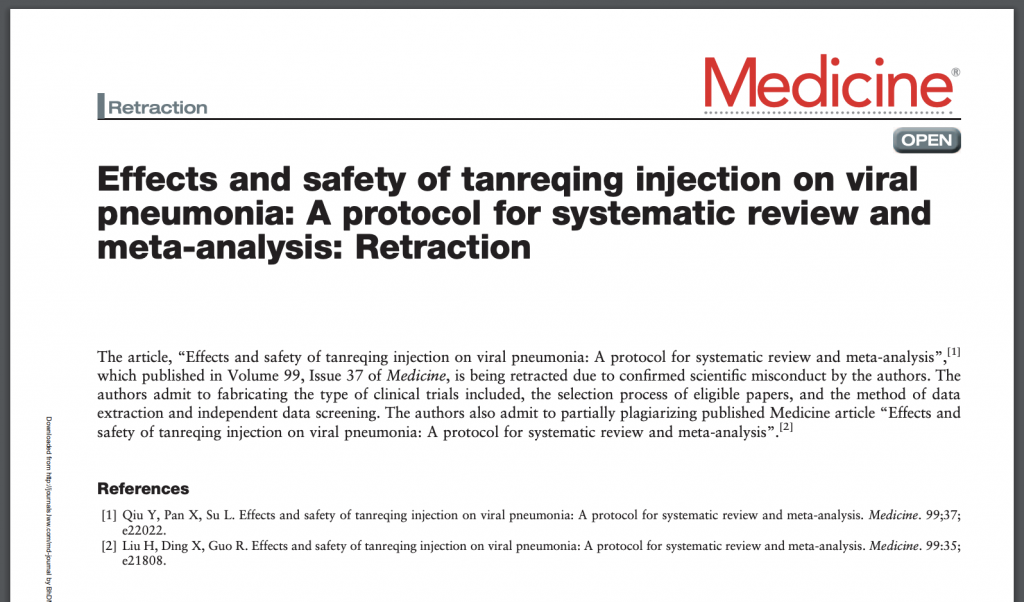
A journal has retracted a paper it published earlier this year for pretty much every sin under the sun, scoring an own-goal in the process.
The article, “Effects and safety of tanreqing injection on viral pneumonia: A protocol for systematic review and meta-analysis,” was led by Yue Qiu, of the Beijing University of Chinese Medicine and appeared in Medicine on September 11.
The tl;dr version of this post: We have questions.
Here’s the retraction notice, which has one of the lowest ratios of words to misdeeds we’ve ever seen:
The article, “Effects and safety of tanreqing injection on viral pneumonia: A protocol for systematic review and meta-analysis”,[1] which published in Volume 99, Issue 37 of Medicine, is being retracted due to confirmed scientific misconduct by the authors. The authors admit to fabricating the type of clinical trials included, the selection process of eligible papers, and the method of data extraction and independent data screening. The authors also admit to partially plagiarizing published Medicine article “Effects and safety of tanreqing injection on viral pneumonia: A protocol for systematic review and meta-analysis”.[2]
In case you’re wondering, the original paper appeared on August 28, about two weeks before the plagiarized version. According to the journal, it had been received July 16 and accepted July 20. Those dates for the now-retracted version: July 21 and July 31.
Ya-Dong Li, the corresponding author on the retracted paper, did not respond to a request for comment.
A common denominator in the two articles is co-author Hui Liu, also of Beijing University of Chinese Medicine.
That raises yet more questions about the validity of both articles. If a retracted paper contains evidence of fabrication and plagiarism, how confident should we be in the integrity of the original material? And what should we make of the fact that the name of one author appears on two highly similar papers … but all the other names differ?
Representatives at Medicine and its publisher, Wolters Kluwer, did not return our emails.
Like Retraction Watch? You can make a tax-deductible contribution to support our work, follow us on Twitter, like us on Facebook, add us to your RSS reader, or subscribe to our daily digest. If you find a retraction that’s not in our database, you can let us know here. For comments or feedback, email us at [email protected].
TCM proponents keep hoping to fool people into believing this hooey. They wouldn’t need to fake the research if it worked in a verifiable way. I don’t care if TCM practitioners keep treating patients, but I do wish scientific journals wouldn’t publish unscientific papers.
Both papers are marked as retracted in PMC.
It’s stunning that the journal didn’t notice that it had published two papers with identical titles.
What’s also interesting is that the common denominator Hui Liu doesn’t even appear in Author Contributions of the Sep 11 paper.
Perhaps the paper mill sold the paper to two groups? Liu found out somehow, and demanded his/her name to be on the other paper, even though other authors of the second paper obviously hated the arrangement.
Or maybe Liu was selling his/her paper through the paper mill? The mill requires that the authors of the second paper include Liu.
How fascinating! Almost Netflix material.
It is an unfortunate reality that we have to confront until we are morally strong to face the challenge of failures. It may be hard to achieve as morality is not a cup of coffee to buy at a store but a self awakening call that requires conscience. While we wait for this to become a reality let us first confront the editors and reviewers who are unable to detect the major problems in the first place.
I think globally we ought to establish a competent review board with multinational researchers that ought to be selected based on an international competition that should be held by a competent scientific body not by an individual or a group. It is only then that we may get some relief and would get to read some decent science otherwise fiction will take over, and unfortunately that is widespread these days.
The results section of the paper is very meta: “The results will be published in a peer-reviewed journal.” O_o
I’m actually a little confused about this one. It seems that this is a research protocol (i.e., their plan for conducting the systematic review and meta-analysis), rather than actual results. I completely get the concerns with plagiarism and agree that is enough for retraction, but I’m unclear as to how the authors could have fabricated analyses that hadn’t taken place yet. Maybe I’m missing something?
The retraction notice doesn’t mention any results of analyses, only methods – though I agree, it seems odd that one could fabricate methods for something that one hasn’t yet done.